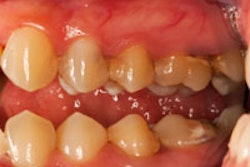Treating periodontal disease may reduce symptoms of prostate inflammation, according to a recent study published in the journal Dentistry (February 9, 2015).
Researchers from Case Western Reserve University studied 27 men who had prostatitis within the past year and whose blood test showed elevated prostate-specific antigen (PSA) levels. The men were also examined for signs of periodontitis.
All the men had moderate to severe periodontal disease, for which they received treatment. During the periodontal care, the men received no treatment for their prostate conditions, but even without prostate treatment, 21 of the 27 men showed decreased levels of PSA. Those with the highest levels of inflammation benefited the most from the periodontal treatment; the other six participants showed no changes.
"This study shows that if we treat the gum disease, it can improve the symptoms of prostatitis and the quality of life for those who have the disease," stated study author Nabil Bissada, DDS, chair of the Case Western Reserve University Department of Periodontics, in a press release.
The authors hope that periodontal treatment will become a standard part of treating prostate disease, much like cardiac patients are often encouraged to visit their dentist before undergoing heart procedures.



















